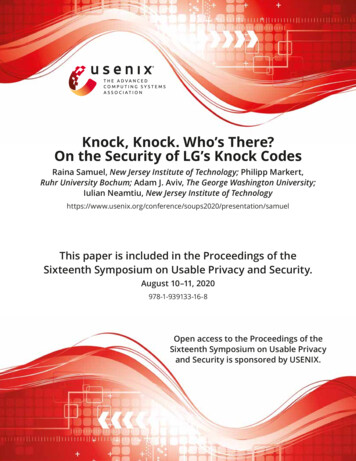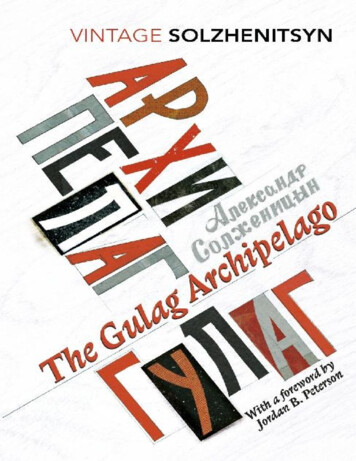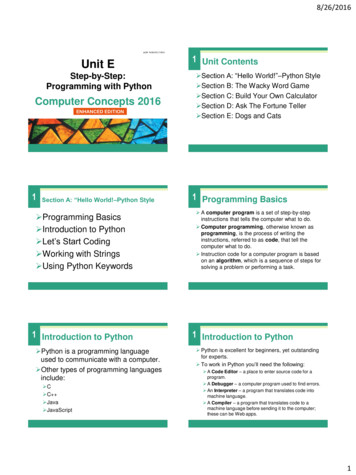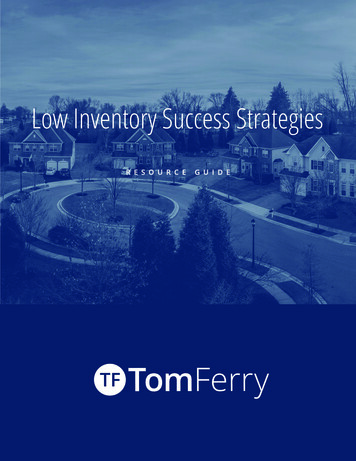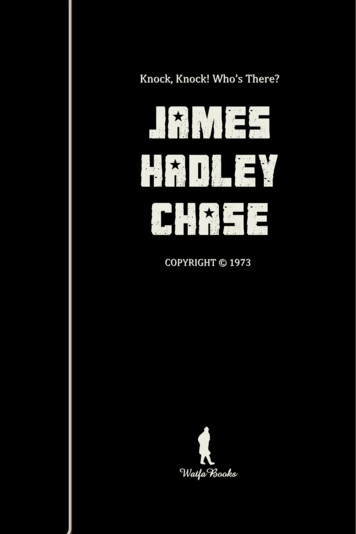
Transcription
Knock, Knock! Who’s There?JAMESHADLEYCHASECOPYRIGHT 1973LWatfaBooks
Copyright note:Please note that the full copyright for this work isowned by Mr. James Hadley Chase and his estate.You are free to use my e-books free of charge foryour personal use only, provided you do not use itfor commercial gain, and acknowledge originalauthorship and full rights to Mr. James HadleyChase and his successors.
This book is for Ozlem Cokker. I hereby dedicate theenergy I wasted in creating this e-book to her, whounknowingly tipped my scales of sanity . . .I hope I can have the chance to see her . . . just once . . .
This e–book was created by Mohamed Watfa. Sendyour comments to medwatt@hotmail.com.I am ready to exchange any Chase book for:The Mirror in Room 22There’s no reason to be mean
Massino’s words echoed in Johnny’s ears—“If anyone busts into that safe, I go after him . . . He wouldn’tget far. Anyone who takes anything from me had better talkto a grave-digger . . .but they won’t. There’s no one dumb enough to try to takeanything from me.”No one, that is, except for Johnny Bianda―a man prepared to risk his neck for a dream—a dream thatnagged at him like an aching tooth.It was attempting the impossible but the urge to get hishands on such a sum added up to a lot more than guts andwith so much at stake it would be worth it . . .
JAMES HADLEYCHASEKnock, Knock! Who’s There?WATFA BOOKS
ONEThe drizzling rain fell on Sammy the Black’s sweating face as heshuffled along carrying the bag of money. He was a tall, ganglingnegro of around thirty years of age. With the muscular shoulders of aboxer and huge hands and feet, few would guess he had the spirit ofa mouse. His large black eyes rolled fearfully as he walked, awarethat he was carrying some sixty thousand dollars in the shabby holdall and what was worse that everyone in the district knew it.Every Friday, at exactly the same time, he did this long walkwhich took four hours. During those hours, he collected money frombars, news-stands and from the Numbers men. During this stop-startwalk, Sammy sweated with fear, expecting at any moment some nutwould shoot him down and grab the money.For five hundred and twenty Fridays, he had done this walk andeven after so many Fridays when nothing had happened, he couldn’tshake the fear out of his system. He kept telling himself that if itwasn’t this Friday, it could be the next.Sammy couldn’t believe, even after ten years, in the power of hisboss, Joe Massino. He couldn’t believe that any one man could havethis sprawling town of close on half a million inhabitants in such arelentless grip that no one—not even a nutter—would dare attemptto steal the bag of money that Sammy was carrying.Sammy had told himself often enough that he was crazy to be soscared since Johnny Bianda was always with him and Johnny wasconsidered the best gunman of Massino’s mob.“If anything happens, Sammy,” Johnny had said, time and again,“fall on the bag and leave the rest to me.”These should be comforting words, but they didn’t comfortSammy. The fact that even Johnny thought something could happenturned Sammy sick to his stomach.All the same, he told himself, it was a lot better than nothing tohave Johnny’s protection. He and Johnny had been Massino’scollectors now for the past ten years. Sammy, at the age of twenty,had taken the job because the money was good and his nerves were7
in much better shape than now. Also, in spite of his fear, he wasproud to have been picked as Massino’s collector for that meant theboss trusted him. Well, maybe not quite trusted him for Johnnyalways went along and there was a fool-proof system against afiddle. Sammy was given a sealed envelope containing the moneyand Johnny a sealed envelope containing a signed chit stating theamount of the money. It was only when they got back to Massino’soffice and stood around while the money was being counted thatthey learned the amount they had collected and the amounts, duringthe ten years they had been collectors, increased every year until thetake on the previous Friday had been the alarming ( to Sammy) sumof sixty-three thousand dollars!Sure, in spite of Massino’s ruthless reputation and Johnny’sability to shoot fast, some nutter would be tempted to snatch themoney, Sammy thought as he trudged along. He looked uneasilyaround him. The busy, shabby street teemed with people who maderoom for him, grinning at him and calling out to him.A big, black buck, nearly as big as Sammy bawled from the stepsof a tenement, “Don’t lose it, Sammy ol’ boy, ol’ boy. That little ol’bag’s got my winnings!”The crowd laughed and Sammy, sweating more heavily,lengthened his stride. They had one more call to make before theycould get into Johnny’s beat-up Ford and Sammy could relax.Watched by the crowd, they walked into Solly Jacob’s bettingoffice.Solly, vast, with a tremendous paunch and a face that looked as ifit had been fashioned out of dough, had the envelopes ready.“Not bad this week,” he said to Sammy, “but tell Mr. Joe, nextweek is going to be a bonanza. February 29th! Every sucker in townwill be trying his luck. Tell Mr. Joe you’ll need a truck to bring themoney in. Don’t kid yourself you’ll be able to carry it.”Sammy cringed as he put the envelope in the bag. “And, Johnny,”Solly said, handing Johnny his envelope, “maybe it would be an ideato get more protection for Sammy next week. Have a word with Mr.Joe.”Johnny grunted. He was a man of few words. He turned to thedoor and went out into the street, followed by Sammy.
They had only a few yards to walk to where Johnny had parkedhis car and with relief Sammy got into the passenger’s seat. Thehandcuff around his thick wrist was chaffing his skin. That wasanother thing that scared him: to be handcuffed to the bag! He hadonce read of some bank clerk who had had his hand chopped offwith an axe by some nutter, trying to get the bag from him. To bewithout a hand!Johnny sank into the driving seat and searched for the ignitionkey. Sammy looked uneasily at him. He had an idea that Johnny hadsomething preying on his mind. For the past few weeks, Johnny hadbeen more silent than he had ever been. Yes, Sammy was suresomething was preying on his mind and this worried him because hewas fond of this short, thickset man with his thick black hair, shotwith grey, his deep-set brown eyes and his firm, hard mouth. Sammyknew Johnny was as tough as teak and he carried a punch like asledge-hammer blow. Sammy had never forgotten how Johnny hadonce handled a punk who had tried to pick a quarrel. He and Johnnywere enjoying a beer in a down-town bar when this punk, twiceJohnny’s size, came up and said in a voice like a fall of gravel that hedidn’t drink in the same bar as a nigger.Johnny had said quietly, “Then drink somewhere else.”That was something Sammy always admired about Johnny: healways spoke quietly: he never shouted.The punk had turned on Sammy who was sweating with fright,but Johnny had stepped between them so the punk had hit him. ToSammy, it seemed a hell of a punch, but Johnny didn’t even grunt. Heswayed a little, then the punk took a bang on the jaw that broke itand flattened him. Sammy hadn’t seen the punch: it had been toofast, but he had seen the effect.Yes, Johnny- was as tough as teak, but he was fine with Sammy.He didn’t talk a lot. In fact, Sammy, after going around with him forten years, knew little or nothing about him except that he had beenMassino’s gunman for some twenty years, was maybe forty- two orthree years of age, unmarried, no relations, lived in a two-roomapartment and Massino thought a lot of him.Whenever Sammy got worried or had woman trouble or hisyoung brother was playing up or something he would consult Johnny,9
and Johnny, speaking in his quiet voice, always managed to makeSammy feel good even if he didn’t solve his problem.When they began the collection together, Johnny had been moretalkative. He had said something that Sammy had never forgotten.“Listen, Sammy,” Johnny had said. “You’ll make good moneyfrom this racket, but don’t let it kid you. You put by ten per cent ofwhat you earn every week. Understand? Out of every ten dollars youearn, put one dollar aside and don’t touch it. In a few years you’llhave enough to be independent and you can get out of this racket,for as sure- as God made little apples, sooner or later, you’ll want toget out.”Sammy had followed this ‘advice. It made sense to him. Hebought a steel box and every week when he got paid he put ten percent of his earnings in the box which he kept under his bed. Ofcourse there had been times when he had been forced to milk thebox. There was that business with his brother who had to have fivehundred dollars or go to jail. Then there was that business with Cloewho had to have an expensive abortion, but over the years the tenper cent mounted up and the last time Sammy checked the amounthe was astonished to find he was worth three thousand dollars.The box which wasn’t large was getting too full of ten dollar billsfor comfort and Sammy began to worry whether to buy another box.There was something about Johnny these days that made himhesitate to ask his advice. He was sure Johnny had something on hismind and he didn’t want to be a nuisance. He thought maybe hewould wait a little longer before consulting him. Maybe he would getwhatever it was off his mind and then, he would be in the mood toadvise him.They drove in silence to Massino’s office: a large room with a bigdesk, a few chairs and a filing cabinet. Massino believed in austeritywhen he was downtown, although he had a Rolls, a sixteen-bedroomhouse up-town, a yacht and a ten-bedroom house in Miami.He was at his desk when Johnny and Sammy came in. Leaningagainst the wall was Toni Capello, one of Massino’s bodyguards: athin, dark man with snake’s eyes and nearly as fast as Johnny with agun. Sitting on a hardbacked chair, picking his teeth with a splinter ofwood was Ernie Lassini, another of Massino’s bodyguards: a fat,hulking man with a razor ‘Sear down the left side of his face: another
good man with a gun.Sammy shambled up to the desk and put the bag in front ofMassino who leaned back in his chair and grinned at the bag.At the age of fifty-five, Joe Massino was massively built. Mediumheight, he had barn-door shoulders, no neck, a heavy fat face with aflattened nose, a straggly moustache and bleak grey eyes that scaredmen, but intrigued women. Massino was a great womanizer.Although fat, he was still tough and there had been times when hehad personally disciplined one of his mob and that man hadn’t beenfit for active service for two or even three months.“No problems, Sammy?” Massino asked and his small grey eyesshifted to Johnny who shook his head. “Okay . . . get Andy.”But Andy Lucas, Massino’s accountant, had already come intothe office.Andy was sixty-five years of age: a tiny, bird-like man with acomputer for a brain. Fifteen years ago he had served a -stretch forfraud and when he had come out, Massino, realizing Andy’sbrilliance, had hired him to control his financial kingdom. As withmost things Massino did, this was a wise choice. There was no one inthe State as smart as Andy when it came to a tax form, aninvestment or an idea to make money.Andy unlocked the handcuff from Sammy’s sweating wrist, thenpulling up a chair by Massino, he began to check the contents of thebag while Massino watched as he chewed a dead cigar.Both Sammy and Johnny moved away and waited. The countcame to sixty-five thousand dollars.Andy put the money back in the bag, then nodding to Massino,he carried the bag into his office and put it in the big, old-fashionedsafe.“Okay, you two,” Massino said, looking at Johnny and Sammy,“take time off. I don’t need you until next Friday. You know whatnext Friday is?” His hard little eyes rested on Johnny.“The 29th.”Massino nodded.11
“That’s it; the freak day: Leap year’s day. It’s my bet the take willbe around 150,000.”“Solly said the same.”“Yeah.” Massino dropped the dead cigar into the trash basket.“So . . . Ernie and Toni will go with you. You’ll collect in the car. Nevermind the traffic. I’ll have a word with the Commissioner. Next Friday,the cops will look the other way if you have to double park 150,000is a hell of a lot of money and maybe some hop-head just might try,”He eyed Sammy. “Take it easy, boy, you’ll be protected. Don’t sweatso.”Sammy forced a sick grin.“I’m not worried, boss,” he lied. “You tell me what to do and I’lldo it.”Out in the drizzle, Johnny said, “Come on, Sammy, let’s have abeer.”This was the usual ritual after the collection and Sammy walkedalong beside the short, thickset man, gradually relaxing until theycame to Freddy’s bar. They went into the warm darkness, climbed onstools and ordered beer.They drank in silence, then Sammy ordered more beer.“Mr. Johnny . . .” He paused and looked uneasily at the hard,expressionless face. “Excuse me, but have you got worries? You’resort of quiet these days. If there’s anything I can do . . .” He began tosweat, scared he had talked out of turn.Johnny looked at him and smiled. Johnny didn’t often smile, butwhen he did it sent a glow of happiness through Sammy.“No . . . there’s nothing.” He lifted his heavy shoulders. “MaybeI’m getting old. Anyway, thanks, Sammy.” He took a packet ofcigarettes, rolled one towards Sammy and lit up. “This is a hell of alifer isn’t it? No future in it for us.” He let smoke drift down hisnostrils, then asked, “How do you feel about it, Sammy?”Sammy shifted on his stool.“The money’s good, Mr. Johnny. I get scared, but the money’sgood. What else could I do?”
Johnny regarded him, then nodded.“That’s right . . . what else can you do?” A pause, then he wenton, “Have you been saving?”Sammy smiled happily.“Just like you told me, Mr. Johnny. One dollar in ten. That’s whatyou said and now I’ve got three thousand bucks in a box under mybed.” He lost his smile as he paused. “I don’t know what to do withit.”Johnny sighed.“You keep all that money under your bed?”“What else can I do with it?”“Put it in a bank, you goon.”“I don’t like banks, Mr. Johnny,” Sammy said earnestly. “They’refor white men. It’s best under my bed. I guess I’ll have to buy anotherbox.”Although Sammy looked hopefully at Johnny wanting him tosolve this problem, Johnny shrugged and finished his beer. Hecouldn’t be bothered with Sammy’s stupid problems. He had toomany problems of his own.“Please yourself.” He slid off the stool. “Well, see you nextFriday, Sammy.”“Do you think there’ll be trouble?” Sammy asked fearfully as hefollowed Johnny out into the drizzle.Johnny saw the naked fear in Sammy’s big, black eyes. He smiled.“No trouble. Not with me, Ernie and Toni with you. Take it easy,Sammy . . . nothing will happen.”Sammy watched him drive away, then he set off along the streettowards his pad. Friday was a long way off, he told himself. 150,000! the Boss had said. Was there that much money in theworld? Nothing would happen. He’d believe that when Friday wasover.13
Johnny Bianda unlocked the door of his two-room apartment. Hemoved into the big living room and paused to look around. He hadlived in this apartment now for the past eight years. It wasn’t much,but that didn’t worry Johnny. At least it was comfortable, althoughshabby. There were two battered lounging chairs, a settee, a T.V. set,a table, four upright chairs and a faded carpet. Through the dooropposite was a tiny bedroom that just took a double bed and a nighttable with a built-in closet. There was a shower and a loo off thebedroom.He took off his jacket, loosened his tie and parked his .38automatic, then pulling up a chair to the window, he sat down.The noise from the street drifted up to him. Noise neverbothered him. He lit a cigarette and stared through the dirty windowpane at the apartment block without seeing it.Sammy had been right in guessing he had something on hismind. This something had been on his mind now for the pasteighteen months. It had begun to nag him on his fortieth birthday.After celebrating with his girl friend, Melanie Carelli, and when shehad fallen asleep, he had lain in the darkness and had thought abouthis past and had tried to imagine what his future was going to be.Forty years old! The halfway mark . . . always provided he didn’t havean accident, got lung cancer or stopped a bullet. Forty years old! Hislife half over!He had thought of the years that had moved behind him. First,he thought of his mother who hadn’t been able to read or write andwho had worked herself to an early death to keep a roof over hishead while his father who had been able to read but not write hadslaved in a fruit-canning factory: two decent God-fearing Italianimmigrants who had loved him and bad hoped for great things fromhim.Just before she had died, his mother had given him her onlypossession: a silver St. Christopher medal on a silver chain that hadbeen in her family for over a century.“There’s nothing more I can do for you now, Johnny,” she hadsaid. “Take this: wear it always: as long as you wear it nothing reallybad can happen to you. Remember that. I’ve worn it all my life andnothing really bad has happened to me. It’s been hard, but not reallybad.”
He had been superstitious enough to have worn the medal andeven now as he sat by the window, he put his fingers inside his shirtto touch the medal.Lying by the side of the gently breathing Melanie, he had thoughtof the years after his mother’s death. He hadn’t settled to anything.He had got tired of his father’s constant nagging and had left home.Although only seventeen, he had got a job as a bartender in a dive inJacksonville. There he associated with the wild boys, the little crooksand the petty con men. He had hooked up with Ferdie Ciano, a smalltime heist man. Together, they had pulled a number of jobs, mostlygas stations until the police caught up with them. Johnny did a twoyear stretch and that decided his fate. He came out of prison,educated in crime and sure that next time he wouldn’t be caught. Fora couple of years he worked solo as a stick-up man. The moneyhadn’t amounted to anything but he was always hoping forsomething big. Then he ran into Ciano again who was now workingfor Joe Massino, an up and coming gangleader. Ciano took him alongand Massino looked him over. He thought Johnny was made of theright material. He had been looking for a young, reliable man, goodwith a gun, to act as his bodyguard. Johnny knew little or nothingabout guns. As a stick-up man he had used a toy pistol. This didn’tbother Massino. He had Johnny trained. After three months, Johnnyproved himself to be a top-class shot and during the years ofMassino’s rise to power, Johnny had killed three times, savingMassino’s life each time from certain death. Now, he had been withMassino for the past twenty years. There were no more killings.Massino was firmly in the saddle. He not only controlled the Unionsin this big town, but also the Numbers racket and there was no onepowerful enough to challenge him. Johnny was no longer hisbodyguard. He had been assigned to take care of Sammy whenSammy collected the money for the Numbers pay-off. Massinobelieved in having young men to protect him. Anyone over thirty-fivewas too old, too slow for protection.Lying on the bed beside Melanie, Johnny had thought about allthis and then turned his mind to his future. Forty years of age! If hedidn’t do something soon, it would be too late. In another two orthree years, Massino would begin to think he was getting too old toguard Sammy. Then what? No golden handshake for Johnny . . . thatwas for sure. He would be offered a job, probably counting Union15
votes, running errands or some such god-awful thing. It would be thekiss-off. He had never been able to save money. His mouth hadtwisted into a wry grin as he remembered the advice he had givenSammy. Somehow his money bad slipped through his fingers:women, his fatal weakness for listening to any hard luck story andbetting on horses that never showed. Money came and went, so heknew when Massino gave him the kiss-off he wouldn’t have enoughto live on the way he wanted to live nor to do what he had alwayslonged to do.Ever since he could remember, he had dreamed of owning aboat. When he was a kid he had spent all his spare time down at theharbour where the rich had their yachts and the fishermen theirboats. The sea had pulled and still pulled him like a magnet. When heshould have been at school, he was messing around in boats. Hedidn’t care bow hard he worked or what he was paid so long as bewas allowed on board. He scrubbed decks, polished brass and splicedropes for nickels. He still thought back on that time when he was akid: the best time of his life!Lying in the dark, he again felt the compulsive urge to return tothe sea, but not as a kid working for nickels and sweating his heartout just to feel the lift and fall of a deck under his feet. He wanted toreturn with his own boat: a sleek thirty-footer and he would charterher for fishing: going along as Captain with one crew—someone likeSammy: even Sammy.The boat of his dreams would cost money: then there was theheavy fishing tackle and the first running expenses. He reckoned hewould need at least 60,000.He told himself he was crazy in the head to be thinking like that,but that didn’t stop him thinking nor dreaming. Like an aching tooth,the dream of owning his own boat, feeling the surge of the seanagged him for as long as he could remember and was nagging himnow as he sat at the window.A dream that could come true if he could lay his hands on a largesum of money.Some six months ago an idea had dropped into his mind whichhe had immediately shied away from . . . shutting it away like a manwho feels a sudden stabbing pain shuts away the thought of cancer.But the idea kept coming back. It even haunted his dreams until
finally, he told himself an idea was just an idea: it could be looked at,couldn’t it? There was no harm in looking at it, was there?And when he began to look at it, he realized for the first timewhat it meant to be a loner. It would have been so much better, somuch more reassuring if he had someone to discuss the idea with,but there was no one: no one he could trust. What was the use oftalking about a thing like this with his only real solid friend: Sammythe Black? What use would Melanie be if he told her what was goingon in his mind? She would hate the idea of the sea and a boat. Shewould think he had gone crazy. Even if his mother had been alive, hecouldn’t have talked to her about it. She would have been horrified.His father had been too dumb, too much of a slave, to discuss withhim any goddamn thing.So he had looked at this idea when he was alone as he was nowbeginning to look at it again while sitting at the window.Simply stated, the idea was for him to steal the Numberscollection, but to justify the high risk, he had, he told himself, to waitpatiently until the big take came along as he knew it must from hispast experience as a collector.And now here it was! February 29th! Something like 150,000!The big take!If I’m going to do it, if I’m ever going to own that boat, Johnnythought, Friday 29th is D-day! With that kind of money, I can buy agood boat, have money over so if the fishing charter idea flops, itwon’t matter. With that kind of money and living carefully, I can lastout until I die and still have the boat, the sea and nothing to worryabout. I swear I’ll kiss the horses good-bye. I might even kiss thechicks good-bye and I’ll shut my ears to any future hard luck story!Well, okay, he said to himself, as he settled his bulk morecomfortably in the old lounging chair, so on Friday night of the 29th,you go ahead and take this money from Massino. You’ve thoughtabout it long enough. You have made plans. You have even gone sofar as to take an impression of the key of Andy’s safe. You have goneeven further than that: you have made a duplicate key from theimpression that you know will open the safe. That was where thosetwo years in jail had’ paid off: you learned things like taking keyimpressions and making keys from the impressions.17
He paused here to recall just how he had got the impression andtiny beads broke out of his forehead when he remembered the riskhe had run.The safe was a big hunk of old-fashioned metal that -stood inAndy’s tiny office, facing the door. The safe had belonged toMassino’s grandfather.More than once, Johnny had heard Andy complain about thesafe to Massino.“You want something modern,” Andy had said. “A kid could bustinto this goddamn thing. Why not let me get rid of it and fix you withsomething modern?”Johnny well remembered Massino’s reply.“That safe belonged to my grandfather. What was good enoughfor him is good enough for me. I’ll tell you something: that safe is asymbol of my power. There’s no one in this town who dare touch itexcept you and me. You put the take in there every Friday andeveryone in this town knows the take will be there on Saturdaymorning for the pay out. Why? Because they know no one wouldhave the guts to touch anything that belongs to me. That safe is assafe as my power . . . and let me tell you, my power is very safe!”But Andy had tried again.“I know all that, Mr. Joe,” he had said while Johnny had listened,“but there might be some out-of-town nutter who couldn’t resisttrying. So why take a chance?”Massino had stared at Andy, his eyes like little pools of ice.“If anyone busts into that safe, I go after him,” he said. “Hewouldn’t get far. Anyone who takes anything from me had better talkto a grave-digger . . . but they won’t. There’s no one dumb enough totry to take anything from me.”But Massino hedged his bets. He had done that most of his lifeand it had paid off. When the Numbers money was locked in the safeon Friday, he left Benno Bianco locked with the safe in Andy’s office.Not that Benno was anything special. He had once been an up andcoming welter-weight, but he hadn’t got very far. He was pretty goodwith a gun and he looked tough: a lot tougher than he was. But thatdidn’t matter. Benno came cheap. He hadn’t cost Massino much and
the suckers of the town were impressed by his battered face, theway he walked and spat on the sidewalk. They thought he was realtough and that was what Massino wanted them to think. With Bennolocked in the office, with Massino’s reputation and that great hunk ofsafe, the suckers who parted with their money felt sure that whenthey came to pay-out day, the money would be there, waiting forthem.Johnny knew all this. The opening of the safe and Bennopresented no problem. He remembered what Massino had said: Noone would have the guts to touch anything that belonged to me.Well, Johnny was going to touch something that belonged toMassino. Guts? Probably not, but the urge to get his hands on such asum, the smell of the sea, the dream of a beautiful thirty-footeradded up to a lot more than guts. A grave-digger? There would be nograve-digger if his planning was right, Johnny told himself.The big safe remained empty all the week. It was only on Fridaythat it was used. There was no combination; just a heavy oldfashioned key. During the months, Johnny, passing by Andy’s opendoor, got to know the key was often left in the lock. On Friday whenthe take was put in the safe, Andy took the key home with him.Three times, long after midnight, Johnny had entered the building,gone up to Andy’s office, picked the door lock and had hunted forthe key. Third time lucky! On a Wednesday night, he had found thekey in the safe. He had come prepared with a lump of softenedputty. The impression had taken only a few seconds, but God! howhe had sweated!No one was ever allowed inside Andy’s office. If someonewanted to speak to him that someone stayed in the doorway and didhis talking but never crossed the threshold. Andy had a thing aboutthis. The only exception was when Benno guarded the safe on Fridaynights, then Andy would clear his desk, lock every drawer andgenerally behave as if vermin was invading his holy of holies.It took Johnny three nights to make the key, then on the fourthnight he returned to the building, again picking the door lock toAndy’s office and tried out his handiwork. A touch with a file, a dropof oil and the key worked perfectly.Taking the money was now easy. Even fixing Benno wasn’t too19
tricky. It was what happened when Massino found he had beenrobbed that mattered.There’s no one dumb enough to try to take anything from me.The trick in this steal, Johnny had decided, was not to letMassino find out who had taken the money. Once Massino knewwho the thief was, that thief had as much chance of surviving as ascoop of ice cream dropped into a furnace.Massino was affiliated with the Mafia to whom he paid regulardues. His own organization could take care of the town: he would getaway as fast as he could. So Massino could call his opposite Mafianumber and alert him. The whole of the Mafia organization wouldswing into action. No one steals from the Mafia or its friends withoutpaying for it: that was a matter of principal. There wouldn’t be atown nor a city in the whole country that would be safe. Johnnyknew all this, and his plan was to fix things so that no one couldguess who had taken the money.He had thought about this a lot as his future and his lifedepended on it. When he had the money, he would rush it across thestreet to the Greyhound left- luggage lockers and dump it there. Themoney would stay there until the heat cooled off—probably three orfour weeks. Then when he was sure Massino was convinced whoeverhad grabbed the money had got away with it, he ( Johnny ) wouldmove the money to a safe- deposit bank. He wished he could do thisas soon as he had the money, but his alibi depended on speed. TheGreyhound bus station was right opposite Massino’s office. It wouldbe only a matter of minutes to dump the bag and get back toMelanie’s pad. The safe- deposit bank
You are free to use my e-books free of charge for your personal use only, provided you do not use it for commercial gain, and acknowledge original authorship and full rights to Mr. James Hadley Chase and his successors. This book is for Ozlem Cokker. I hereby dedicate the energy I wasted in creating this e-book to her, who

